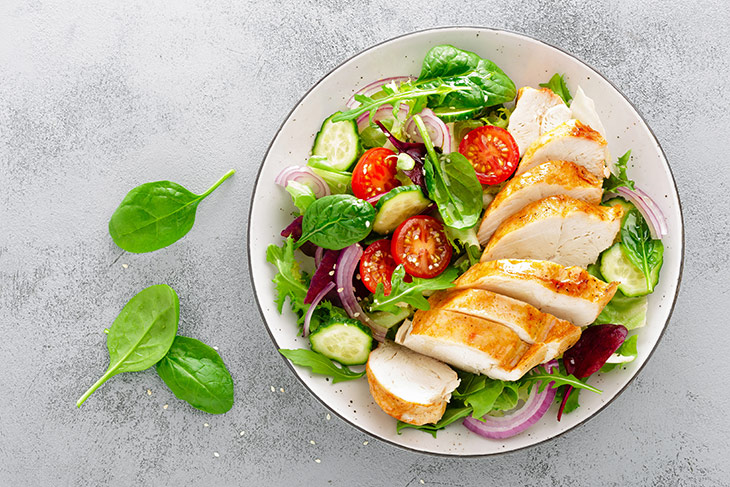Does a high protein diet burn fat?

Higher protein diets, like the Total Wellbeing Diet, have been shown to be successful in reducing body weight but do they, as some sources have it, burn fat?
According to Professor Manny Noakes, Research Director for Nutrition and Health at CSIRO, a high protein diet does not help to burn fat, however there are several benefits that can lead to more successful weight loss.
Higher protein diets are often referred to as fat burning because they keep you feeling full for longer, and therefore make it easier to reduce kilojoule intake overall, which does burn body fat.
A high protein diet leads to fullness
The main benefits of a high protein diet is the feeling of fullness that it provides and a retention of lean mass. Changing from a carbohydrate heavy diet to a high protein diet means being able to stick to a lower kilojoule count throughout the day.
“If you have white toast with jam for breakfast, for example, you’ll be ready for a snack mid-morning. An egg on wholegrain low GI toast, on the other hand, will see you through until lunch," says Professor Noakes.
"This not only means fewer kilojoules per day, it means less perception of deprivation – which is definitely a bonus".
Protein can increase the feeling of fullness because it lowers the amount of the hormone ghrelin which contributes to your levels of hunger. By improving weight regulating hormones it is possible to lower the overall kilojoule intake without feeling the need to restrict other foods.
An additional bonus to high protein diets is the research shows they better preserve muscle mass throughout your weight loss journey.
High protein diets can boost metabolism
Digestion, absorption, transport, metabolism, and storage of nutrients all require energy that our body burns after we eat food. This process, known as a thermogenic effect, happens more in some foods than others. In particular, eating a high protein diet has a higher thermic effect than consuming other food types such as carbs or fats which can result in burning more energy throughout the day.
Studies on high protein diets have shown that protein intake results in a boost of metabolism which can help achieve weight loss goals.
Focus on more than one ingredient
A word of warning: this is not a license to eat as much protein as you want. If you continue to eat the same number of kilojoules as you did pre-adopting a high protein diet, you will not burn fat. A high protein diet can help contribute to fat loss if it still incorporates a varied diet.
The trick to staying on track is to combine your carbs with low GI foods and regular protein hits throughout the day.
The CSIRO Total Wellbeing Diet, as well as focusing on several serves of protein rich foods throughout the day, also includes smaller amounts but regular serves of slow release carbohydrates.
As with protein, these low GI foods provide energy and valuable nutrients, slowly releasing them throughout the day – contributing to keeping you feeling full, and better able to stick to a lower kilojoule diet and ultimately, burning fat and losing weight.
"The key is a higher protein pattern in conjunction with low GI grains fruits vegetables and dairy foods. Good nutrition is more than focusing on one nutrient".
The best protein sources
The CSIRO Total Wellbeing Diet provides an easy guide to get a great mix of nutrients, a variety of foods – essential to good long-term health and get the right balance of low GI foods, carbohydrates, fats and protein through the menu plans, recipes and shopping lists.
That said, when you’re out and about, it’s handy to know how to make high protein diet food choices.
“Lean meats – think beef, lamb, chicken, eggs, tofu and fish; nuts, milk and Greek yoghurt, and beans are all good sources of protein that are readily available," says Professor Noakes.
"Pop lean grilled meat or boiled eggs on a green salad for an easy lunch – or pop some smoked salmon into two slices of wholegrain bread with avocado for spread and some leafy greens for a portable sandwich”.
Curb the cravings with Protein Balance
Check out our Protein Balance program - a plan based on the latest nutritional science. Research shows that by redistributing protein more towards breakfast leads to reduced cravings, improved muscle metabolism and weight loss.
Want to learn more about high protein diets? Check out our complete guide to losing weight on a high protein diet!
